Events and Activities
Onsite Study Group on Paradigms of Sociality and Family Engagement among Japanese Men
 The ideologies associated with fatherhood in Japan are changing rapidly in tandem with shifting beliefs about family relationships and work-life balance. While many Japanese fathers aspire to be strong presences in their children’s lives, these men often cannot locate in their own emotionally distant fathers any role models for paternal involvement. What does it mean to be a father in contemporary Japan? How does one learn more about child care, especially when the overwhelming amount of parenting information targets mothers? Can fathers find inspiration outside their families, such as by forming supportive relationships with other parents? This talk will explore how some Japanese fathers are pursuing answers to these questions. It draws upon more than two years of ethnographic fieldwork among parenting-focused groups in the Greater Tokyo Area, and considers what these answers might mean for families, the communities in which they live, and wider society. Details and registration here
The ideologies associated with fatherhood in Japan are changing rapidly in tandem with shifting beliefs about family relationships and work-life balance. While many Japanese fathers aspire to be strong presences in their children’s lives, these men often cannot locate in their own emotionally distant fathers any role models for paternal involvement. What does it mean to be a father in contemporary Japan? How does one learn more about child care, especially when the overwhelming amount of parenting information targets mothers? Can fathers find inspiration outside their families, such as by forming supportive relationships with other parents? This talk will explore how some Japanese fathers are pursuing answers to these questions. It draws upon more than two years of ethnographic fieldwork among parenting-focused groups in the Greater Tokyo Area, and considers what these answers might mean for families, the communities in which they live, and wider society. Details and registration here
Open access book by Nicole M. Mueller studies Japanese Thomas Mann translations
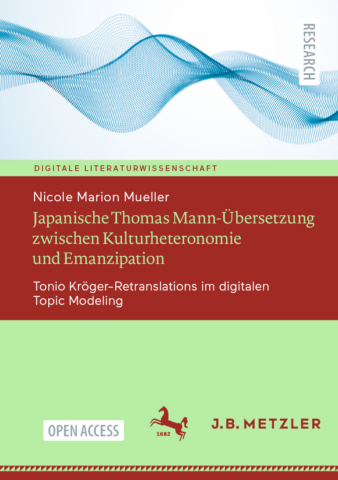
In her new book Japanische Thomas Mann-Übersetzung zwischen Kulturheteronomie und Emanzipation: Tonio Kröger-Retranslations im digitalen Topic Modeling (Japanese Thomas Mann translation between Cultural Heteronomy and Emancipation: Digital Topic Modeling of Tonio Kröger Retranslations), DIJ researcher Nicole Marion Mueller uses innovative digital methods to study Japanese translation pluralism in the 20th century. Focusing on Japanese translations of Mann’s novel Tonio Kröger, she retraces the intensive reception of Mann’s literary works in Japan while paying special attention to the interrelations between translation and a variety of historical contexts and actors – most prominently the elitist kyoyoshugi movement rooted in Japan’s prewar education system. Nicole combines this extensive research work with a topic modeling-based mixed methods approach, which enables her to reveal the previously hidden interactions between the re-translated texts as well as patterns of influence and distinction spanning decades of translation history. The book is published by J.B. Metzler in the Digital Literary Studies series and available open access.
Barbara Holthus explains Germany’s fertility rate development in Japanese journal article
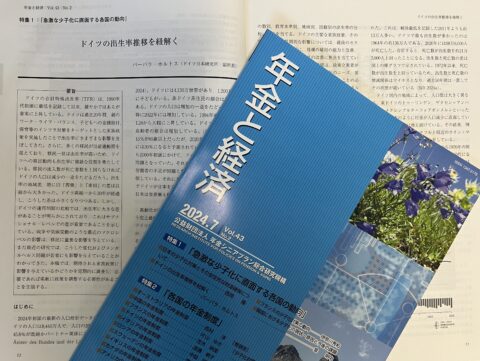 Unlike Japan, Germany’s total fertility rate has shown a slow but steady increase since its lowest point in the early 1990s. What are the factors behind this development? In the article 「ドイツの出生率推移を紐解く」(“Unraveling Germany’s fertility rate development”, in Japanese), DIJ sociologist Barbara Holthus explains how Germany has implemented a mix of family policies targeting time, money, and infrastructure measures for parents. Over the last 20 years, they have had varying influences on the fertility rate. As data shows, migration trends into Germany also play a complex role for its fertility rate, as many migrants are of child-bearing age and first-generation migrants have higher birthrates. In addition, there are significant differences in fertility rates at the sub-national level. Recent macro level influences like war and climate change are also important influences on Germany’s youth, coupled with rising rates in mental health problems. The article is published in a special section on countries facing a rapidly declining birthrate in the summer issue of the Japanese journal Pension and the Economy (『年金と経済』).
Unlike Japan, Germany’s total fertility rate has shown a slow but steady increase since its lowest point in the early 1990s. What are the factors behind this development? In the article 「ドイツの出生率推移を紐解く」(“Unraveling Germany’s fertility rate development”, in Japanese), DIJ sociologist Barbara Holthus explains how Germany has implemented a mix of family policies targeting time, money, and infrastructure measures for parents. Over the last 20 years, they have had varying influences on the fertility rate. As data shows, migration trends into Germany also play a complex role for its fertility rate, as many migrants are of child-bearing age and first-generation migrants have higher birthrates. In addition, there are significant differences in fertility rates at the sub-national level. Recent macro level influences like war and climate change are also important influences on Germany’s youth, coupled with rising rates in mental health problems. The article is published in a special section on countries facing a rapidly declining birthrate in the summer issue of the Japanese journal Pension and the Economy (『年金と経済』).
Book chapter by Nicole M. Mueller on the historical and institutional contexts that shaped Japanese retranslation
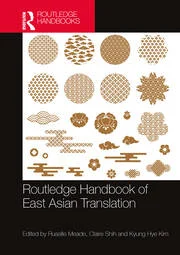 Since ancient times, translation into Japanese has facilitated innovation across a variety of disciplines. Translators functioned as mediators of a foreign culture that was commonly perceived as superior. This tradition became all the more essential after Japan’s forced reopening in the late 19th century after 200 years of self-imposed cultural isolation. In this context, retranslations of Thomas Mann’s classic novel Tonio Kröger form a crucial interface between Japan’s academic, educational, and literary history shaped by the elitist kyōyōshugi movement and its idealisation of 19th century European culture. Based on the digitally augmented analysis of 15 such retranslations, DIJ researcher Nicole M. Mueller retraces how 20th and 21st century Japanese retranslation can be understood as the result of an ongoing negotiation between heteronomy and autonomy toward the West that shaped Japan’s cultural self-image. “Japanese Retranslations in the Twentieth and Twenty-first Centuries: Between Heteronomy and Autonomy toward the West” is published in the Routledge Handbook of East Asian Translation.
Since ancient times, translation into Japanese has facilitated innovation across a variety of disciplines. Translators functioned as mediators of a foreign culture that was commonly perceived as superior. This tradition became all the more essential after Japan’s forced reopening in the late 19th century after 200 years of self-imposed cultural isolation. In this context, retranslations of Thomas Mann’s classic novel Tonio Kröger form a crucial interface between Japan’s academic, educational, and literary history shaped by the elitist kyōyōshugi movement and its idealisation of 19th century European culture. Based on the digitally augmented analysis of 15 such retranslations, DIJ researcher Nicole M. Mueller retraces how 20th and 21st century Japanese retranslation can be understood as the result of an ongoing negotiation between heteronomy and autonomy toward the West that shaped Japan’s cultural self-image. “Japanese Retranslations in the Twentieth and Twenty-first Centuries: Between Heteronomy and Autonomy toward the West” is published in the Routledge Handbook of East Asian Translation.
Working Paper by Harald Kümmerle on Japanʼs COVID-19 response, surveillance capitalism and cyber civilization
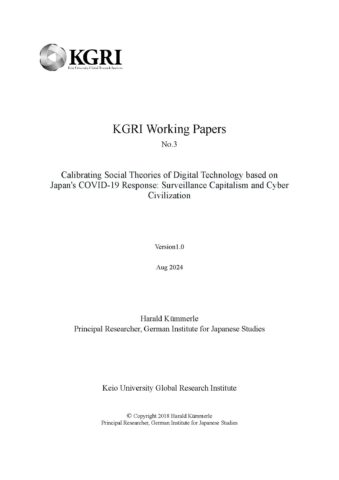
A new working paper by DIJ researcher Harald Kümmerle examines Japan’s response to the COVID-19 pandemic in comparison to other East Asian countries. Drawing on Shoshana Zuboffʼs perspective of surveillance capitalism and Jiro Kokuryoʼs theory of cyber civilization, it argues that Japanʼs aerosol and droplet simulations on the supercomputer Fugaku helped devise efficient countermeasures that did not aim for the complete elimination of the virus. The paper also demonstrates the importance of understanding how the measures in Japan related to the idea of trust and successfully relied on self-restraint (jishuku). Calibrating Social Theories of Digital Technology based on Japan’s COVID-19 Response: Surveillance Capitalism and Cyber Civilization is published open access as Working Paper No. 3 by Keio University’s Global Research Institute.
Hybrid Study Group on Male Care Work in Japanese Manga

Over the past three decades, Japanese media productions, especially manga, have primarily been examined with regard to hegemonic images of ‘femininity’ and as indicators of social change. Only few studies have focused on media constructions of ‘masculinity’. In this talk, Ralf Windhab presents preliminary findings of his doctoral dissertation, which analyzes various Japanese manga that depict male characters as protagonists engaging in unpaid household chores. These portrayals contradict the prevailing image of men as the breadwinners of the family and women as the ones responsible for the household. The research presented shows that some male characters are portrayed as weak or partially feminine in accordance with stereotypes and clichés, while others are portrayed as overly masculine. The actual household chores depicted and their frequency, as well as the different motives for the men to participate in household chores, will also be discussed. Details and registration here
Open access article by Celia Spoden on end-of-life decision-making in ALS
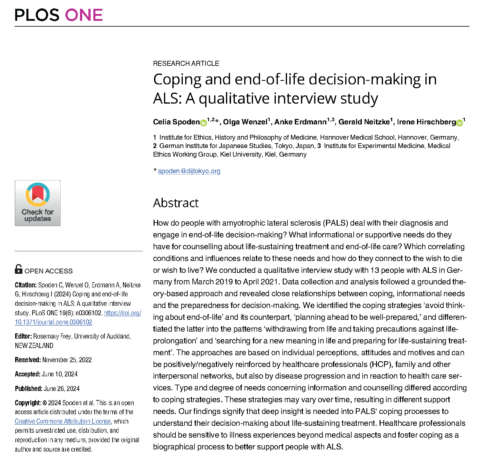 How do people with amyotrophic lateral sclerosis (ALS) deal with their diagnosis and engage in end-of-life decision-making? This new study, co-authored by DIJ researcher Celia Spoden, Olga Wenzel, Anke Erdmann, Gerald Neitzke, and Irene Hirschberg, addresses these and related questions based on qualitative interviews with 13 people with ALS. Data collection and analysis followed a grounded theory-based approach and revealed close relationships between coping, informational needs, and the preparedness for decision-making. The authors identified the coping strategies ‘avoid thinking about end-of-life’ and its counterpart, ‘planning ahead to be well-prepared,’ and differentiated the latter into the patterns ‘withdrawing from life and taking precautions against life-prolongation’ and ‘searching for a new meaning in life and preparing for life-sustaining treatment’. The study recommends healthcare professionals to be sensitive to illness experiences beyond medical aspects and foster coping as a biographical process to better support people with ALS. The article is available open access here
How do people with amyotrophic lateral sclerosis (ALS) deal with their diagnosis and engage in end-of-life decision-making? This new study, co-authored by DIJ researcher Celia Spoden, Olga Wenzel, Anke Erdmann, Gerald Neitzke, and Irene Hirschberg, addresses these and related questions based on qualitative interviews with 13 people with ALS. Data collection and analysis followed a grounded theory-based approach and revealed close relationships between coping, informational needs, and the preparedness for decision-making. The authors identified the coping strategies ‘avoid thinking about end-of-life’ and its counterpart, ‘planning ahead to be well-prepared,’ and differentiated the latter into the patterns ‘withdrawing from life and taking precautions against life-prolongation’ and ‘searching for a new meaning in life and preparing for life-sustaining treatment’. The study recommends healthcare professionals to be sensitive to illness experiences beyond medical aspects and foster coping as a biographical process to better support people with ALS. The article is available open access here
Book chapter by Harald Kümmerle on mathematical knowledge production
 A new book chapter by DIJ researcher Harald Kümmerle analyzes the structure, reception, and production of mathematical knowledge in the early 1930s. Based on a case study of the history of a paper on duality written by the Japanese mathematician Tannaka Tadao in 1938, the chapter provides insights into the development of Tannaka’s research and into processes of cooperative knowledge production, including influences from and exchanges with mathematical communities in Japan and abroad. “Tannaka Tadao‘s 1938 paper on the duality of noncommutative topological groups and its historical background” is published in Duality in 19th and 20th Century Mathematical Thinking (Science Networks. Historical Studies series, vol 63. Cham: Birkhäuser 2024), edited by Ralf Krömer and Emmylou Haffner.
A new book chapter by DIJ researcher Harald Kümmerle analyzes the structure, reception, and production of mathematical knowledge in the early 1930s. Based on a case study of the history of a paper on duality written by the Japanese mathematician Tannaka Tadao in 1938, the chapter provides insights into the development of Tannaka’s research and into processes of cooperative knowledge production, including influences from and exchanges with mathematical communities in Japan and abroad. “Tannaka Tadao‘s 1938 paper on the duality of noncommutative topological groups and its historical background” is published in Duality in 19th and 20th Century Mathematical Thinking (Science Networks. Historical Studies series, vol 63. Cham: Birkhäuser 2024), edited by Ralf Krömer and Emmylou Haffner.









 Open Access
Open Access
